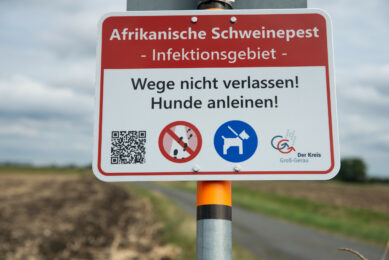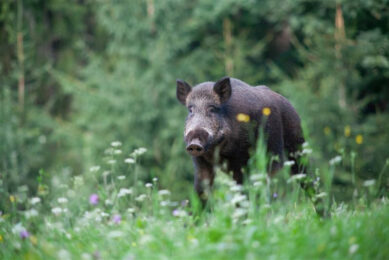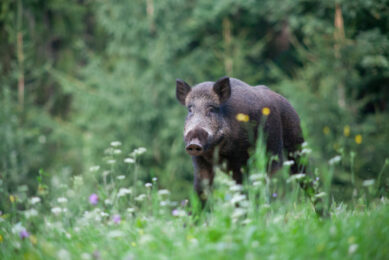Influenza and PCVD discussed at fourth Merial Swine Forum
Over 230 swine pathology experts, vets, and researchers from over 28 countries of Europe and South Africa, participated in Merial’s 4th Swine Forum in Berlin, Germany, on May 30 and June 1. Main question of the forum: Is PCVD and Swine Influenza under control?
Concluding the Forum, Sophie Randoux, swine marketing head EMEA for the French animal health company concluded: “Yes! As we have seen, PCV2 and SI vaccines have proved their efficacy and also their technical and economic advantages as illustrated by trials done in research centres and by field testimonials. Diagnostic techniques and vaccination schedules are among subjects which still need to be explored and which will be mobilizing our teams in the coming months.”
Sub-clinical forms
Dr Joaquin Segalès, director of the Animal Health Research Centre (CreSA) of Barcelona, Spain, opened the discussion on sub-clinical forms linked to Porcine Circovirus 2. As the vaccine has demonstrated its efficacy on the clinical form of the disease, Segalès invited the audience to consider efficacy of this vaccination on the more insidious subclinical form which is often a source of deteriorations of technical performance, hence economic performance.
Moreover, Professor Hans Nauwynck, of the University of Ghent, Belgium, reminded the assembly of the role of PCV2 in reproduction disorders and opened the debate on the importance of vaccinating breeders, and especially gilts against PCV2. Testimonies from European practitioners have confirmed the positive role of PCV2 in reproduction disorders in breeders and particularly in gilts.
“Although I was absolutely convinced of the importance of Circovac vaccine against PCV2 in piglets, this forum has made me reconsider my position regarding the vaccination of breeders,” said Francesco Salvini, a swine veterinarian, at the end of the PCVD Day presentations, which had clearly demonstrated the extra benefits of vaccinating piglets and breeders on a same farm.
Swine influenza virus
The second day was devoted to swine influenza, helped participants to evaluate the impact of this disease which remains a serious problem in all countries of Europe, as explained by Dr Gaëlle Simon, member of the ESNIP 3 (European Surveillance network for Influenza in pigs), and leader of the Work Package 2: Collecting swine influenza strains and epidemiological data. Gaëlle explained that in 2011, in most European countries, the most prevalent strains of swine influenza virus were H1N1, H1N2 and H3N2.
Gripovac 3 vaccine is the first vaccine which enables protection against these three strains. Dr Karen Van der Meulen, virologist at the Faculty of Veterinary Medicine at Ghent University, Belgium, shared results of research which proved the efficacy of the vaccine in reducing clinical signs, virus titre in the lungs and nasal excretion in piglets challenged with a recent European H1N2 strain. However the pandemic strain of the H1N1 virus needs to be further managed as it is still present throughout Europe; protection by the commercial vaccine does exist, but requires further investigations.
Reduction of antibiotics
For these two major pathologies which were the object of at least 13 presentations, it was quite obvious that vaccination caused a considerable reduction on the impact of pathogens on the technico-economic performance of farms, as well as less use of antibiotics.
This was a major subject which was the object of the opening lectures of the Merial Forum on 31st May. Drs Schillinger, Andreasen and Aerts practising respectively in Germany, Denmark and the Netherlands, explained their countries’ strategy regarding the reduction in the use of antibiotics on farms. Strict control on farms, formal legal notice procedures and sanctions to counter excessive use are all means used to control and limit the use and prescription of antibiotics, in order to achieve a 50% drop in use over the next five years.
Vaccination to reduce antibiotics
In this context, “which is inevitably impacting all production areas, all countries are affected; and vaccination is proving to be the strongest weapon of all to control the the reduction in antibiotic consumption,” said Randoux in her concluding remarks.
“Vaccines against PCV2 and swine influenza have already broadly proved themselves, as illustrated by the diverse presentations of the Forum, coming from both fundamental science and practical field experience. Nevertheless, more studies are absolutely necessary, especially in the field of diagnostics, the prevalence of contaminants, and vaccination schedules which need to be even better adapted to different field situations.
“We still have lots of work before us”, she said announcing the 5th Merial Forum in 2013, which will be designed, as former symposia, on the complementary nature of presentations from fundamental science and testimonies from practitioners from all over Europe.
Related website:
• Merial











